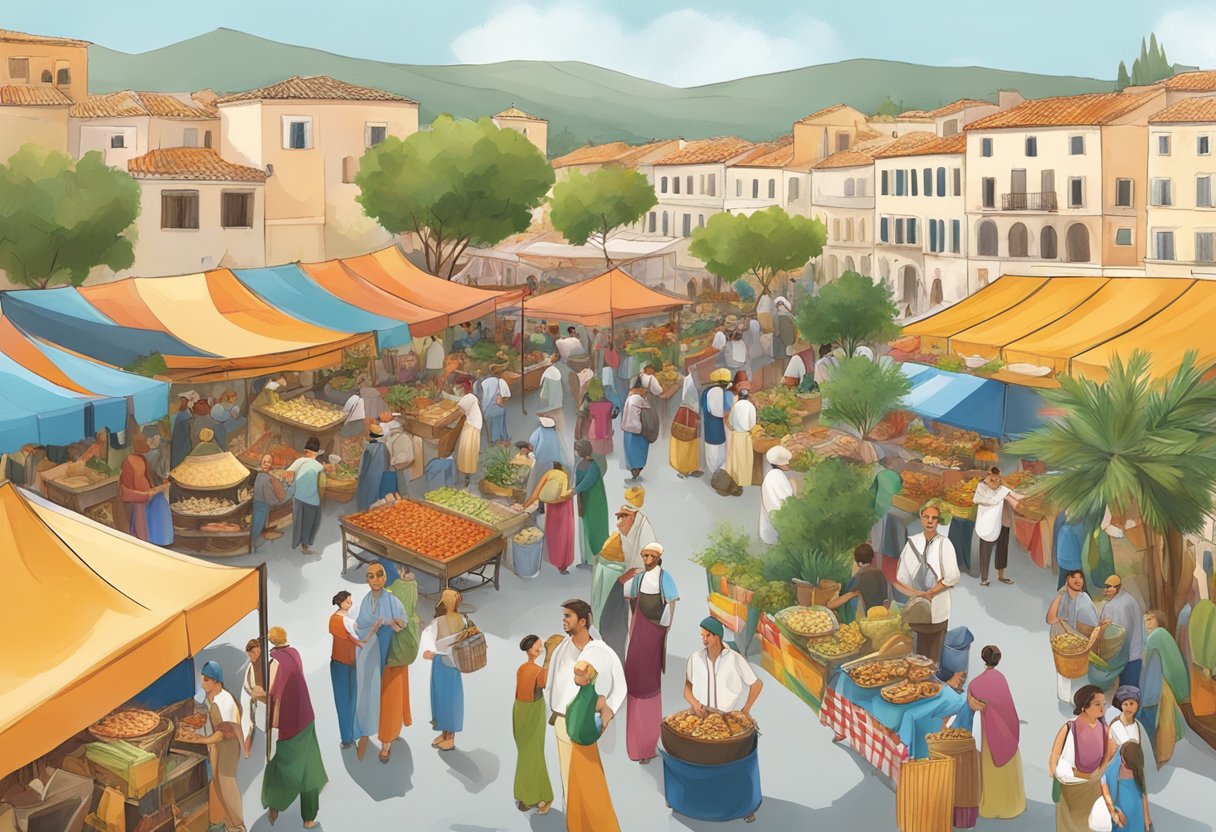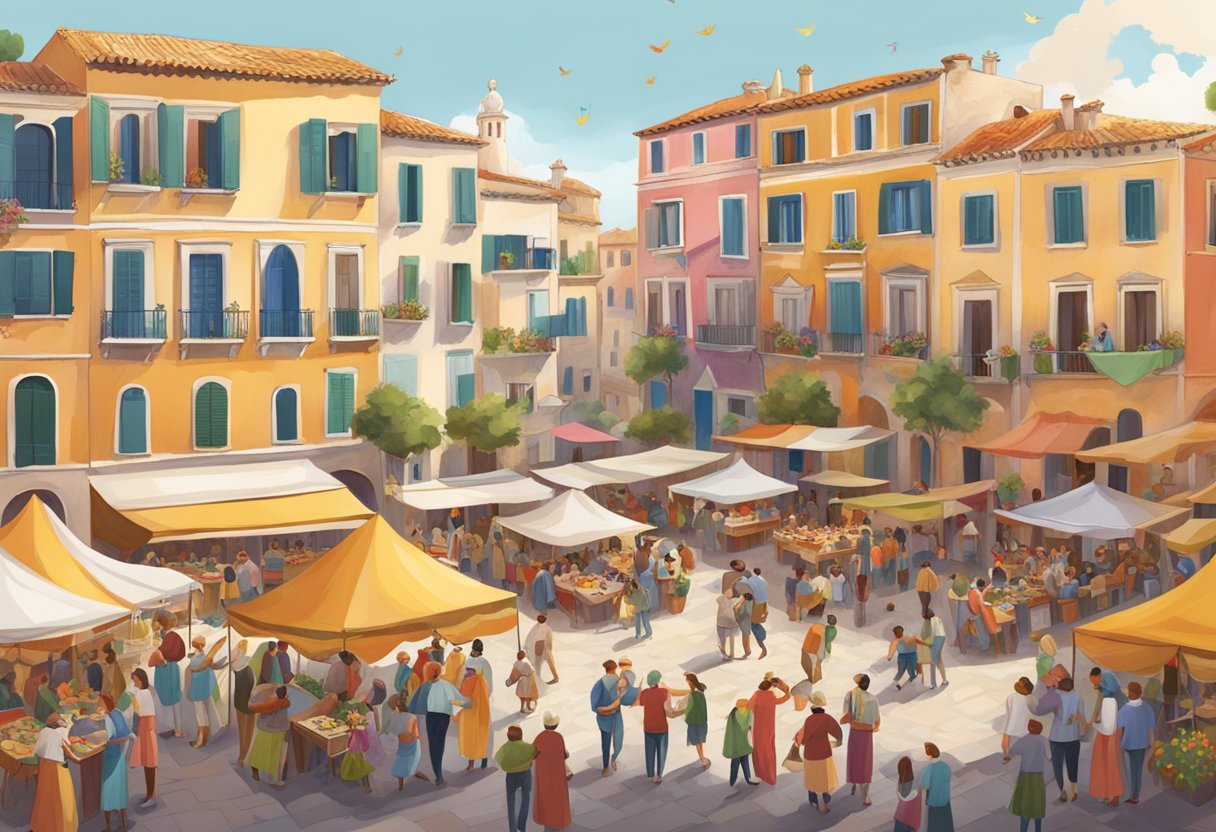Traditional Mediterranean festivals are a vibrant mosaic of culture and art, fostering unity and reinforcing a sense of community among residents and visitors alike. They are not merely celebrations; they embody the traditions and identity of the peoples of the Mediterranean basin.
Through these festivals, local culture is both preserved and promoted, showcasing the rich tapestry of customs that have been passed down through generations. The social fabric of Mediterranean society is strengthened as these events become a platform for cultural production and consumption, bringing to life the intangible heritage that forms a critical part of the region’s identity.

As a crossroads of civilizations, the Mediterranean region boasts an array of traditional festivals, each contributing to the local economy and community development in its unique way. These celebrations act as a catalyst for social capital, creating bonds between individuals and groups through shared experiences centered around arts and culture.
Traditional culture is not just preserved but also evolved through the kaleidoscope of activities ranging from music and dance to food and crafts, which also support a diversity of cultural expressions.
Importantly, these gatherings underscore the significance of cultural policy in sustaining and nurturing cultural heritage. They are integral to maintaining the vibrancy of Mediterranean societies, offering opportunities for togetherness and expressions of community solidarity.
In doing so, they enrich the lives of those who participate, whether as creators or spectators, and contribute to a sense of place and continuity that is cherished by local communities and admired by those from afar.
Table of Contents
Historical Evolution of Mediterranean Festivals
The festivals of the Mediterranean have evolved over millennia, reflecting the cultural and religious shifts of the region. They continue to be a testament to the enduring legacy of ancient practices and the evolution of community celebration.
Antiquity to the Middle Ages
Mediterranean festivals have their roots in ancient times, where they were often tied to the agricultural calendar and the worship of gods. In Ancient Rome, festivals like the Ludi were public games held for the enjoyment of the people and to honor the gods. A significant festival was the Panathenaia in ancient Greece, which included both athletic and musical contests and was held every four years to honor Athena, the goddess of wisdom and war. These festivals were not only religious observances but also served as communal gatherings that reinforced social bonds and collective identity, often culminating in a banquet shared amongst participants.
Traditions like sacrifices to the gods or commemorations of ancestors were integral to these festivals. Games held in Olympia, which began in 776 BC as a tribute to Zeus, united the Greeks in periods of peace; the Olympic Games were as much a religious festival as an athletic competition. Festivals became state-instituted occasions, allowing rulers to strengthen their social and political bonds with the populace. Festivities often included elements of exclusion, as certain roles or events were reserved for specific segments of society, such as citizens or soldiers.
Modern Era Development
As time progressed, the history of Mediterranean festivals began reflecting more modern transformations. The revolution of societal structures in the Mediterranean altered traditional festivities, which either adapted to new realities or vanished over time. New festivals emerged, sometimes reviving or repurposing ancient traditions to foster a renewed sense of communal identity. The historical legacy of Ancient Rome and Greece continued to be felt through these celebrations, as certain aspects survived into the modern era.
The introduction of Christianity led to a reinterpretation of many pagan festivals, with Christian meanings being superimposed onto older rites and celebrations. Festivals that had been based on the agricultural cycles and the honoring of pagan gods took on new significance, often associated with the lives of saints and Christian holidays. Despite these changes, the core purpose of fostering community and celebrating shared history and culture remained the same.
Throughout these transformations, Mediterranean festivals have continued to encourage community cohesion and reflect the shared time and history of the people, while being shaped by the varied cultural influences that have traversed the region.
Cultural Significance and Social Aspects

Traditional Mediterranean festivals and celebrations are vital in promoting community spirit and preserving a rich tapestry of cultural heritage. They embody the artistic expression and historical narrative of a community.
Fostering Local Identity and Belonging
These festivities provide a unique platform for individuals to express their local identity and sense of belonging. Art and cultural heritage take center stage, allowing communities to showcase their distinctive customs and traditions. For example, in the polyculture of the Mediterranean landscape, such festivals serve as a manifestation of the diverse agricultural customs that contribute to the region’s identity and communal bond.
Cultural and Historical Continuity
Festivals act as conduits of cultural and historical continuity, connecting the present with the past. Through the reenactment of myths and historical events, celebrations strengthen the collective memory and ensure the transmission of heritage from one generation to the next.
Interconnections of Art, Music, and Dance
The interweaving of art, music, and dance is central to these festivals, reflecting a diverse melange of cultural heritage. Each festival is replete with vibrant displays of creativity, from traditional folk dances to the sounds of classic Mediterranean melodies, portraying a society’s aesthetic lineage and deepening communal togetherness.
Festivals as a Catalyst for Community Unity
Traditional Mediterranean festivals are more than just celebrations; they are a vital bridge that reinforces social bonds and communal identity. These events are treasured not only for their vibrancy but also for their role in fostering unity and connections among residents.
Promotion of Shared Values and Traditions
Mediterranean festivals are an expression of cultural heritage where shared values and traditions are at the forefront. They provide a stage for cultural consumption through which communities can explore and celebrate their common history and social practices. During these festivals, the norms and stories of the Mediterranean life are passed down, reaffirming the community’s roots and collective memory.
Creating Spaces for Interaction and Unity
Festivals craft intentional spaces for interaction, becoming social hubs where residents from different backgrounds congregate. These gatherings create opportunities for community members to build personal relationships, forging a network of social capital crucial for communal support systems. The interactive nature of festivals often leads to increased understanding and tolerance within the community.
Role of Festivals in Strengthening Community Ties
Beyond entertainment, Mediterranean festivals significantly contribute to community development. They act as catalysts for growth, including the growth of tourism, which brings new perspectives and economic benefits to the region. Moreover, community festivals are pivotal in strengthening community ties by offering a sense of belonging and involvement, essential for a cohesive society. They energize the community, drawing upon the collective spirit to pursue future-assured development.
Economic and Tourism Implications
Mediterranean festivals and celebrations hold significant sway in contributing to both the economic fabric and tourism landscape of the region. They not only serve as a beacon for cultural expression but also as a catalyst for economic and touristic growth.
Boost to Local Economy and Development
Traditional Mediterranean festivals are often a cornerstone for economic stimulation within local communities. They aid in infusing capital into the local economy by generating revenue through various channels such as ticket sales, vendor activities, and sponsorship deals. This cyclic influx of funds is pivotal for local development, often leading to the reinvestment in public services and infrastructure, thereby propelling further growth.
Attraction of Visitors and Tourists
The allure of festivals extends beyond mere entertainment; it is a significant draw for visitors and tourists who flock to cities to immerse themselves in the unique cultural experiences. This influx of visitors benefits the local economy through accommodation bookings, dining, and purchases of artisanal goods. The reputation of such events often spreads internationally, garnering attention through advertising and word-of-mouth, thus placing the region on the global tourism map.
Impact on Local Businesses and Stakeholders
Local businesses experience a direct impact from the foot traffic and visibility that comes with festival tourism. Restaurants, retailers, and service providers see an uptick in business activity as they cater to the needs of tourists, which can lead to long-term customer relationships. Moreover, the engagement of local stakeholders, including planners, vendors, and artisans, creates a collaborative environment that ensures the sustainability and ongoing success of these festivals.
Cultural Practices in Contemporary Festivals

Contemporary Mediterranean festivals vividly showcase time-honored cultural practices through immersive culinary experiences, grand processions, and dynamic artistic showcases that engage both locals and visitors.
Food and Culinary Experiences
Mediterranean festivals are renowned for their emphasis on culinary delight, serving as melting pots of tradition and taste. The festivals often feature stalls brimming with gluten-free options, acknowledging the rising interest in health-conscious diets. Classic dishes like paellas and grilled seafood are prepared with gluten-free grains and ingredients, allowing everyone to indulge in local flavors.
Traditional Processions and Parades
Processions and parades are the cornerstone of Mediterranean identity, where the streets come alive with color and energy. Participants clad in traditional attire weave their way through cobblestone streets, honoring patron saints or seasonal cycles. These ritualistic celebrations cement community bonds and often involve the use of water in ceremonies, symbolizing purification and renewal.
Artistic Performances and Exhibitions
Festival management teams go to great lengths to curate arts and culture programs that highlight local and international talent. Festivals host a plethora of performances, ranging from open-air theater to local bands and film screenings. These exhibitions celebrate and preserve the rich artistic heritage of the region, serving as both entertainment and educational experiences for all.
The Role of Environment and Sustainability

Traditional Mediterranean festivals and celebrations are not only culturally significant but also have a profound impact on the environment and sustainability efforts within the region. These events offer a unique opportunity to preserve local biodiversity and promote sustainable practices.
Preservation of Local Biodiversity and Natural Resources
The Mediterranean region is known for its diverse ecosystems and biodiversity, including an array of endemic species. Festivals often celebrate this rich natural heritage, and some have integrated practices that encourage the preservation of local biodiversity. In France and Greece, for instance, celebrations of wine underscore the importance of sustainable viticulture and the conservation of local grape varieties, which in turn supports a broad spectrum of plant and animal life. Festivals associated with wine also bring attention to the need for water conservation and the protection of terrestrial ecosystems amid the challenges posed by climate change.
Sustainable Festival Management
Sustainable festival management has become a key focus within the Mediterranean, with organizers increasingly implementing measures to reduce environmental impact. This includes minimizing waste through recycling and composting, encouraging the use of public transportation to decrease carbon emissions, and promoting local food markets featuring Mediterranean ingredients that support a gluten-free diet. By integrating these sustainable practices, festivals not only enhance the community’s connection to the environment but also exemplify a commitment to preserving it for future generations.
Influence on Sociopolitical Discourses

Traditional Mediterranean festivals exemplify how cultural events contribute to the discourse surrounding social and political issues, serving as platforms that amplify the voices of cultural producers and citizens alike. These festivals have the power to both reflect and shape the political landscape, often becoming touchstones for broader conversations about democracy and revolution.
Festivals as Platforms for Political and Social Issues
Festivals act as a microcosm of society, where cultural expression and political discourse intersect. They open a space for dialogue on critical issues, where cultural producers can present artwork or performances that critique current policies or social norms. As celebrations rooted in community values, these festivals allow citizens to explore and contest the dynamics of power, providing a forum for political issues to be presented in a cultural context.
Mobilizing Citizens and Promoting Civic Engagement
By engaging with the themes presented in festivals, citizens are often mobilized towards civic participation. Festivals can spark discussions on the tenets of democracy, potentially leading to calls for reform or revolution. This catalyst effect can encourage broader civic engagement, as community members come together in a festive environment that fosters a stronger sense of agency and unity.
Local vs. Global: Cultural Exchange and Adaptation
Mediterranean festivals embody a rich tapestry of cultural heritage, simultaneously evolving through global influences and maintaining traditional customs. They offer a vivid glimpse into how local traditions adapt and global cultures integrate.

Integration of Global Cultural Influences
Mediterranean regions, from Athens to Barcelona, have witnessed a harmonious blend of global cultural consumption and local festivity. In Barcelona, the famed La Mercè reflects this with international music and performing arts enhancing the Catalan experience. Conversely, visitors to Pisa’s Regatta of the Ancient Maritime Republics absorb unique historical contests enriched by diverse global spectators.
Preservation of Local Traditions Amidst Globalization
Despite globalization, cities like Athens uphold their customs with staunch dedication. The Athens Festival, a celebration of classical music and theatre, remains a bastion for Greek cultural heritage. Similarly, Mediterranean coastal towns preserve their seafaring legacies through traditional boat races, safeguarding such practices for future generations. This resolve ensures that, even as global influences permeate, the distinct identity and diversity of Mediterranean traditions continue to thrive.
Organizational Aspects of Festival Management
Effective festival management hinges on comprehensive planning and the ability to adapt, ensuring that these cultural institutions not only provide income for communities but also contribute to a robust cultural economy.
Professional Training and Development
The success of a traditional Mediterranean festival greatly depends on the expertise of its professionals. It is imperative that these individuals receive thorough training to handle the multifaceted tasks of festival management. This training encompasses various aspects, from logistical coordination to cultural sensitivity, aiming to enhance the collective experience of the festival-goers while maintaining the authenticity of the event. Cultural institutions are tasked with crafting training programs that are both inclusive and comprehensive, addressing the unique characteristics of Mediterranean festivals.
Crisis Management and Resilience in Festival Operations
When facing crises, such as natural disasters or public health emergencies, festival operations must demonstrate resilience. Having well-prepared crisis management strategies in place is vital for mitigating risks and ensuring the continuation of the festival’s traditions. The management teams are tasked with devising contingency plans that prioritize safety without diminishing the cultural significance of the festival. Continual assessments and updates to these plans are essential, given that they directly affect the festival’s income and the community’s well-being.
Heritage and Recognition: UNESCO and Cultural Preservation
The recognition of festivals and celebrations as a cornerstone of Mediterranean cultural heritage plays a key role in community solidarity and identity. UNESCO’s efforts in cataloging and protecting this intangible heritage is integral to its preservation and the continuance of community traditions.
World Heritage Sites and Festivals
The Mediterranean is dotted with UNESCO World Heritage Sites, often the backdrop for vibrant festivals that attract both locals and tourists alike. These festivals showcase traditional costumes, music, dance, and food that are crucial aspects of the region’s identity. For instance, the Annual Festival of Saint John in the Old City of Corfu, a UNESCO World Heritage Site, celebrates local folklore with traditional music and dance performances in public spaces, reinforcing a sense of place and history.
UNESCO’s Role in Promoting Cultural Festivals
UNESCO’s endorsement of festivals under its cultural policy not only brings global recognition but also encourages local communities to sustain their cultural practices. Through its lists of Intangible Cultural Heritage, UNESCO aims to enhance visibility for the traditions that define communities. The agency’s role extends to providing support for cultural festivals as platforms for public expression and communal participation, thereby fostering a spirit of unity and pride in their shared heritage.
Research and Studies on Festival Impacts
Extensive research has been conducted on the impacts of traditional Mediterranean festivals, revealing how these events foster community cohesion and provide economic enhancements.
Surveys and Data Analysis
Surveys have played a crucial role in quantifying the economic benefits of community festivals. Data analysis from these surveys indicates that festivals significantly increase the number of visitors to the region, which in turn supports local businesses and artisans. For example, analysis of festival data can highlight the median age of attendees, their employment status, and their spending habits, contributing to a deeper understanding of the festival’s economic footprint.
Interviews with Participants and Officials
Interviews with various stakeholders, such as participants, priests, and officials, offer qualitative insights that support the quantitative data. Through personal narratives, one learns about the festivals’ role in reinforcing a sense of community and belonging. Interviews can disclose the sense of unity experienced during communal rituals and the parties’ self-celebration, as mentioned in studies like the one on the impact of festivals.
Case Studies on Specific Festivals
Case studies provide a focused lens on individual festivals, documenting their unique contributions to cultural heritage and community bonds. Each festival has its story, and these studies can capture the specific ways in which they contribute to the social fabric. Detailed analysis often reveals the festivals’ evolution over time and their embeddedness in wider networks, as detailed through research like Expanding the Domain of Festival Research.
Conclusion

In the Mediterranean region, festivals and celebrations serve as keystones for community cohesion and cultivation of cultural heritage. These events have long stood as a testament to the enduring cultural policy that values tradition and communal ties. Not only do they offer a platform for the expression of arts and culture, but they also contribute significantly to economic development in the region.
Social capital is enriched through the unity experienced during these festivals. Residents and visitors alike engage in the area’s rich heritage, laying the foundation for enduring bonds and a shared sense of identity. The prevalent themes of Mediterranean festivities—often marked by vibrant colors, lively music, and traditional dances—reflect the cultural unity and diversity of the communities that celebrate them.
While not ostensibly linked, these celebrations echo the principles of the gluten-free Mediterranean diet, which emphasizes natural, artisanal foods. Both the diet and the festivals underscore the importance of locality and sustainability, echoing the Mediterranean spirit of living in harmony with both culture and nature.
In conclusion, traditional Mediterranean festivals are vibrant expressions of cultural heritage that bolster a sense of community and unity, while also promoting economic development and a cultural policy that supports arts and culture. By celebrating their unique traditions, Mediterranean societies foster a robust social capital and proudly pass down their rich heritage to future generations.



